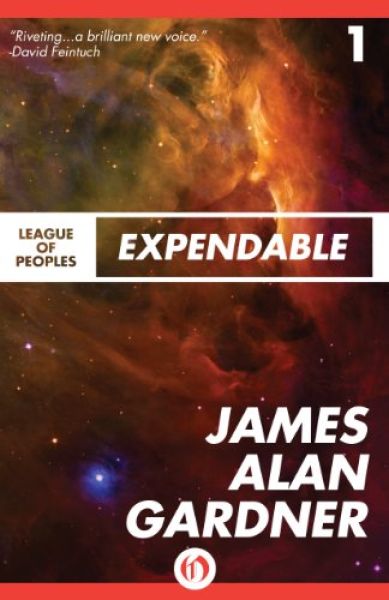“My name is Festina Ramos, and I take great pride in my personal appearance.”
Expendable (League of Peoples, volume 1)
By James Alan Gardner

16 Sep, 2014
KW Science Fiction and Fantasy
0 comments

Given that the University of Waterloo has been a hotbed of innovation since its founding it is not surprising that there have been science fiction authors connected with it at least as far back as the 1970s, but despite the fact that I have lived on campus on and off since 1961 I’ve met fewer of them than seems reasonable in retrospect.
It may be that at some point during his years at UW, I crossed paths with Thomas J. Ryan (The Adolescence of P1) but that would only have been in the literal sense, two strangers passing on some particular bit of campus. It’s not impossible that at some engineering mixer thrown by my parents I met the late Edward Llewellyn-Thomas (The Douglas Convolution as well as other books) but if I did I certainly never connected him with his pen name Edward Llewellyn. The first science fiction author connected with the University of Waterloo I know for a fact I met is James Alan Gardner, whose work I heard first on radio in the 1970s, who I met in person thanks to a UW theatre group, and who gives me a ride to gaming every week.
Festina Ramos is a member of the glorious Explorer Corps, that chosen elite who get to go down to the surface of unexplored worlds once the probes have hit their limit of usefulness to see what exciting new ways each new world has of killing people like Festina. That process of discovery is often called going Oh Shit because those are usually the last words heard over the explorers’ radios.
What makes Festina and her chums chosen is that each of them has some disability, physical or social, that makes them unappealing to their fellow citizen without interfering with their ability to carry out their duties. When beautiful, likable people have the flesh melted off their bones by some alien pollen, surviving crew members can be consumed by grief — but stick someone whose personality is grating or whose face is marred, as Festina’s is, by a port-wine mark down on some new killer world and it turns out spacers are surprisingly comfortable if the explorers die. This being the case, the Technocracy makes a point of keeping an eye out for people born with a specific range of disabilities, taking special care that none of the ones with the mental acuity ever gets the medical treatment that would deal with their particular issue.
There is a further twist, which is that the human Technocracy is part of a much larger League of Peoples and the League forbids the killing of sentient beings under any circumstance. Those who do kill are kept sequestered on whichever planet they committed their murder or, if they try to travel to another system, killed through means too advanced for the Technocracy to understand or evade. Explorers are therefore denied any weapon easily used to kill.
The Explorers have a different name for themselves; Expendable Crew Members.
Festina is bitterly resigned to a short but interesting career but the news that she and another ECM have been assigned to accompany a senile admiral to the planet Melaquin comes as an unpleasant surprise. Over the years many ECM teams have visited Melaquin and all of them have gone silent almost immediately after reaching the surface. Now Festina will get to find out why.
As the author explains in Expendable’s dedication
Finally, a big hello and thank you to my fellow writers in FASS ’77. Somewhere in our script meetings, the phrase “Expendable Crew Member” was spoken for the first time. It rattled around in my head for almost twenty years, and look what finally came out.
(By the way, other authors who may be worrying at this juncture what amusing anecdotes I can recall about the genesis of their books can be comforted by the knowledge my silence can be bought for a very reasonable sum.)
I have to say the more we heard about the Technocracy the worse it sounds. Since it began as the sort of place that would deny kids elective surgery to force them to accept suicidal career assignments, you might not think it was possible to be worse and yet somehow the Technocracy found a way. Truly, human ingenuity is awe-inspiring. At least there are hints the human Technocracy is not entirely irredeemable and as I recall the later books, there is more going on with the Technocracy’s habitual corruption than the usual human pettiness.
The League of Peoples is a mostly off-stage presence, the great instrumentalities whose full and undivided attention the Technocracy’s rulers would wisely do almost anything to avoid, but they do come off as jerks if you think about what they do for any length of time. Again, Festina doesn’t know the whole story, at least not at this point.
This moves along very nicely and Festina is an engaging protagonist, as are most of her fellow ECMs. It’s also an incredibly quick read; I began it at about 2 PM and finished by 5. Large portions of it are very funny, which you might not expect from the sections above. Humor in SF is generally a risky move but Jim carried it off effectively.
There are seven novels in the League of Peoples series and all of them are currently available as ebooks. A sample of this novel may be found here. I enjoyed them when I first read them and I hope you will enjoy them now.
